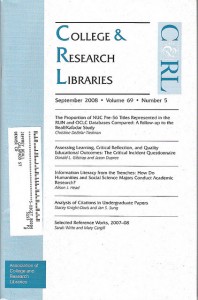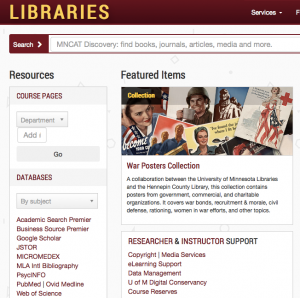12.4 Scholarly Sources
The main objective of scholarly sources is to report on new knowledge or experimentation and to share that information with the appropriate specialist audiences. Scholarly journal articles, research reports, conference papers, books, reference guides and the myriad of other formats for scholarly publication delivery reflect this purpose.
Critical to understanding scholarly sources is understanding the peer review process during which the ideas are subjected to close scrutiny by experts in the field who decide whether or not the information is fit to be published and shared with the scholarly audience. Peer review is what distinguishes scholarly publications from journalistic or trade publications where an editor, not a panel of academic peers, determines whether or not something is ready for publication.

Scholars use scholarly journals for keeping up with research, to find other scholars doing similar work, and as teaching resources. Most information created by scholars is produced, collected and arranged according to subject areas, or disciplines. Much of the information generated by scholars is published in journals and on websites where the findings are open to scrutiny by other scholars and general readers. These publications are typically found in library collections and can be searched through specialized databases that libraries pay for and make available to users.
If you are looking for authoritative information about a topic or an area of endeavor, chances are there are scholarly publications that have addressed it. For example, EconLit indexes hundreds of the world’s major economic journals. A communicator searching in this index will locate information from the top scholars and work that has been fully peer reviewed. Many of the articles included in indexes and abstracts are now available in “full-text” which provides “one-step” access to the articles themselves.
The variety of resources on any given topic can be illustrated in this image from the University of Minnesota library web site.  On the homepage there is a directory of “Databases” organized by title of the index or tool. Or you can search for a database by the topic of your information need. So for your search on information about football brain injuries, you could use the pull-down menu to search for the databases that would lead you to scholarly publications in the Health Sciences.
On the homepage there is a directory of “Databases” organized by title of the index or tool. Or you can search for a database by the topic of your information need. So for your search on information about football brain injuries, you could use the pull-down menu to search for the databases that would lead you to scholarly publications in the Health Sciences.
This would help you locate the scholars who have been producing authoritative published research on the topic for a number of years. Your report would be incomplete without including such findings, along with interviews with the researchers who conducted the studies.

